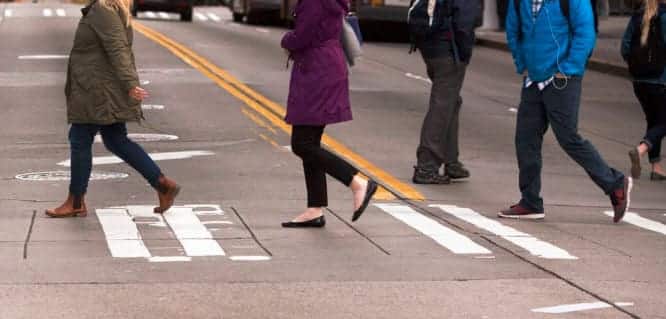I have seen the extensive damage and loss caused by even one distracted driving crash. “I’m so sorry” or ” I wish I wouldn’t have been on my cellphone” has no purposeful meaning once the damage is done. There is no going back.
Sue Lee was a skilled seamstress at a local clothing manufacturer. Her work required focus and attention to detail. She loved her job and her co-workers were like family. During breaks, they traded stories about their children and grandchildren. They enjoyed exchanging recipes. Mrs. Lee looked forward to getting up each day and working with her friends.
Her job—and her life— changed in one moment. Early one evening, a commercial driver struck her with his van. He was clearly distracted, not even looking at the street in front of him.
If he had, he would have seen Mrs. Lee, squarely in the marked crosswalk. He would have seen that she had the walk sign. Instead, the driver sped forward through the intersection and made a left turn directly into Mrs. Lee.
Because of the distracted driving crash, Mrs. Lee suffered serious orthopedic injuries and a traumatic brain injury. She was left with many disabilities and limitations, and never returned to her work. She required daily care from her family.
This one distracted driving crash had a huge impact. It changed the lives of Mrs. Lee, her husband, their children. It changed things for their extended family, and all her friends and coworkers.
It also changed the life of the van driver, who has to live every day knowing how his choice harmed so many people.

The distraction problem
Distraction is defined as “unable to concentrate because one’s mind is preoccupied”.
Distracted driving is defined as “the practice of driving a motor vehicle while engaged in another activity, typically one that involves the use of a mobile phone or other electronic device.” There are essentially 4 types of distractions while driving.
- Visual distraction: looking at something other than the road and vehicles around you.
- Auditory distraction: hearing something not related to driving.
- Manual distraction: manipulating something other than the steering wheel.
- Cognitive distraction: taking your mind off driving.
While each of these types can be expanded upon, it is fair to say that nearly all possible distractions while behind the wheel of a vehicle fall into one of these categories.
An estimated 391,000 drivers were injured in distracted driving crashes in 2017. For comparison, there were 39,773-gun deaths in the United States in 2017.
In 2019, distracted driving was a reported factor in 8.5% of fatal motor vehicle crashes.
AAA says that distracted driving accounts for 25- 50% of all collisions.
Yet, no one seems to think that they are distracted. Or, that their distraction is a serious problem.
Recommended Article: Is It Illegal to use an Expired Car Seat
There are no distracted driving accidents
I don’t want you to think of distracted driving crashes as “accidents.” Distracted driving is a choice. It is very rarely an accident. We have control over our choices, and when a driver choses to pick up their cellphone, that choice may have serious consequences.
I share the story of Mrs. Lee, and other stories of my clients, not because I want to you to be sad, or feel guilty about your own driving choices — I want you to be informed. I want to prevent the distracted driving crash that could destroy your life.
Besides holding wrongdoers accountable and, it is my goal to push through my legal work for change. Change in the behavior of those behind the wheel of a vehicle. You have only one duty when driving: put 100% of your focus on the task. Your life and the lives of others are at stake.
Attorney Kevin Coluccio
Helpful Reading: New Washington State Distracted Driving Law: What you need to know



